From Traffic in Tan Tan to 1818 golden eye, a number of livelihood programs are frequently published.

Recently, a special topic-# Live in Reality # rushed to Weibo for hot search, and many netizens cried.
This is a clip from the people’s livelihood news program "Traffic in Tan Tan": Uncle who is nearly 70 years old, both parents died early, and his wife, children and brother passed away. He was riding on a small tricycle with seven or eight hundred catties of wood on it, sitting on a country road with his stupid brother who couldn’t communicate and a yellow dog who had been raised for more than ten years and was about to die of old age.
Faced with such an absurd life experience than the script, when police officer Tan asked "Why do you look so happy", grandpa naturally said, "Look ahead." This passage, which appeared in the news of people’s livelihood, is real and dramatic.
The human reality behind the livelihood program
This piece of material is not the first time to get on the hot search, but the source of this piece of material, Tan Tan Traffic, has continuously contributed to the funny news that broke the circle in recent years.
Traffic in Tan Tan is a traffic popularization program jointly prepared by the Traffic Police Detachment of Chengdu Public Security Bureau and Chengdu TV Station. Hosted by Tan Qiao, a traffic policeman, carrying a camera to chase people and cars in the streets, interviewing and educating all kinds of traffic offenders. In Douban, the program scored as high as 9.6 points.
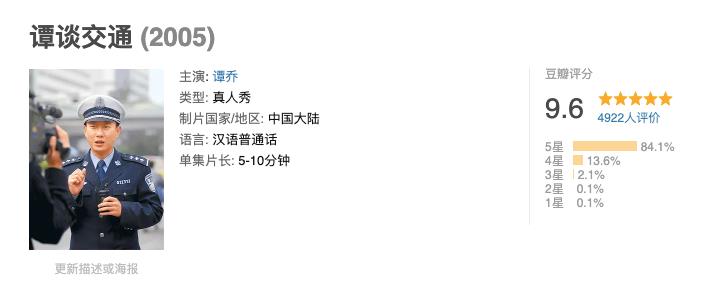
Douban screenshot
The people’s natural creativity and the host Tan Qiao’s gradually skillful sense of variety show have produced countless ridiculous "famous scenes" in the original serious process of popularizing the law.
For example, a shy man who didn’t wear a shirt covered his upper body with a small pink towel for questioning, and his shyness aroused police officer Tan’s competitiveness. Hearing the other party say "selling cute", police officer Tan thinks he is a professional, but after listening carefully, he found that the man said "selling film";
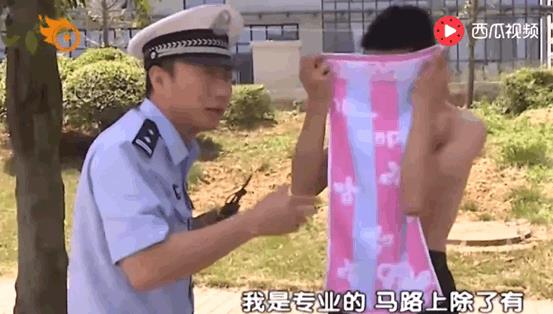
Another example is Master Zheng of Henan Province, a "master of Chinese Wushu". He sat on a pile of wobbly beer bottles and insisted on performing a Chinese kung fu waist-horse combination for police officer Tan, and finally gave himself a shoulder throw.
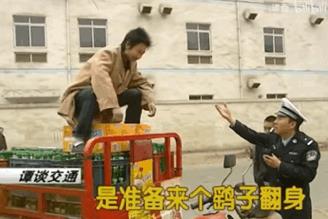
There are also Fujian people who are recognized as Koreans because of their strong dialect accent. The police officer Tan who communicated with them almost exhausted all his foreign language skills in his life.
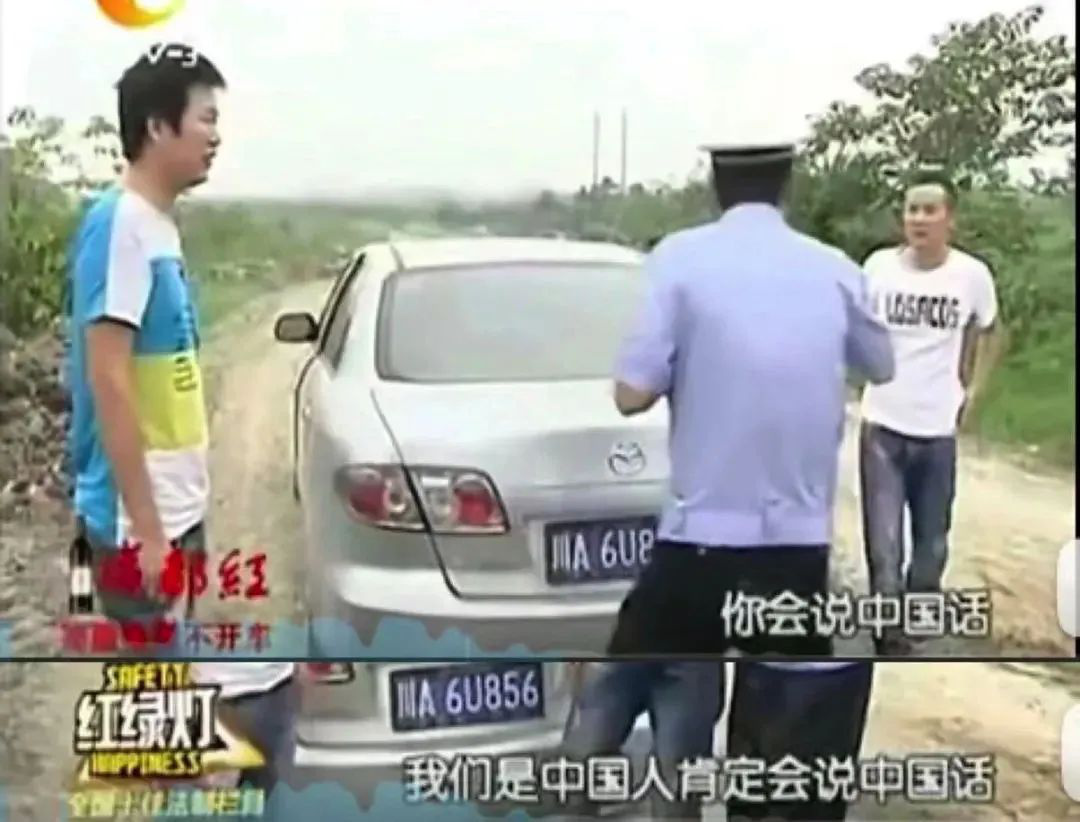
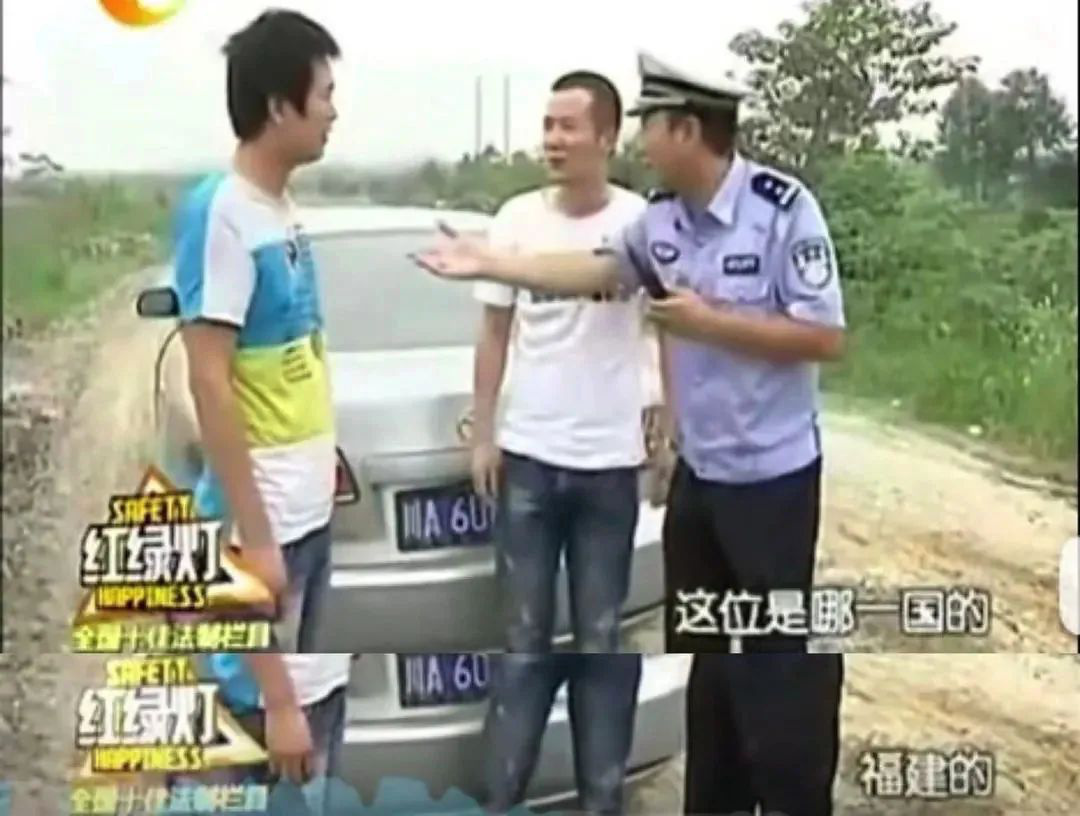
As well as Traffic in Tan Tan, there are many livelihood programs such as 1818 golden eye, which has been searched for many times because of funny news, and the new and old uncles and peacemakers, which are eye-catching because of farce.
Maybe you are not the audience of these local TV programs, but you must have heard of it more or less: Xiao Zhang, who was cut by a glass door and angered to defend his rights, was exclaimed by the whole network as "how can he be hurt by being so handsome";
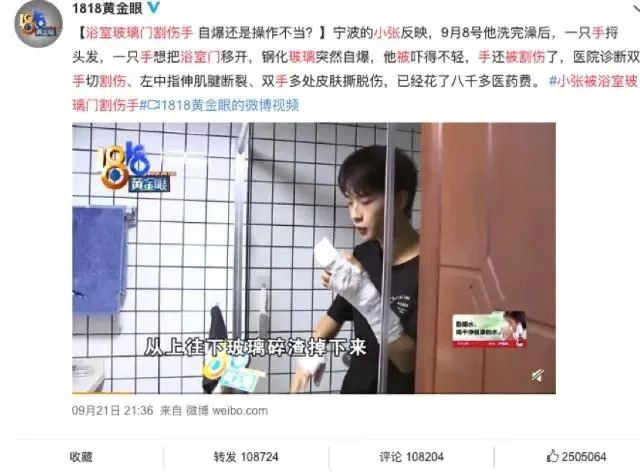
Xiao Wu, who received a receipt of 40,000 yuan for repairing sideburns, was made into an expression pack and spread all over the network;
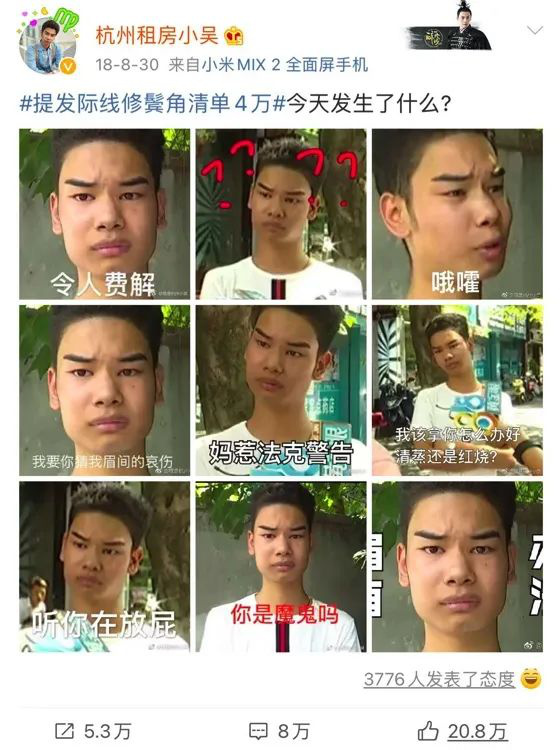
Luo Luo, a girl from Hangzhou who is known as the "real version of Fan Shengmei" accidentally fell into the river and died, was once out of control and exaggerated by her family during the reconciliation process, and was pointed out by her boss as "claiming for buying a house for her brother several times".
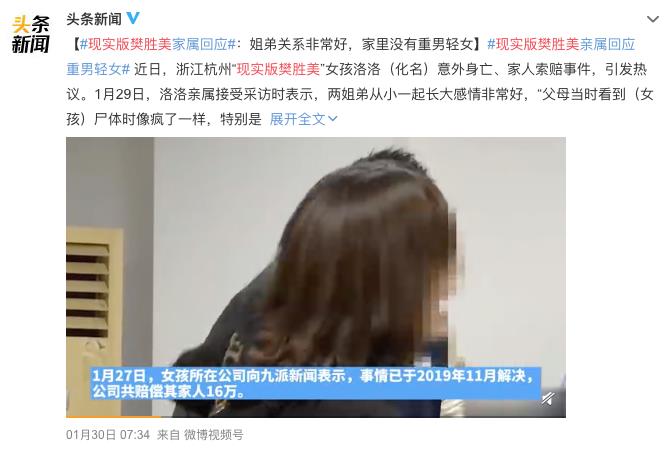
With the absurd joy brought by the trivial things in life and counting the trivial things on the screen, many local people’s livelihood programs have come out again and again in the new media era.
People’s livelihood news from newspapers to TV
People’s livelihood news was first born in newspapers. Under the joint efforts of a large number of newspapers, such as Huaxi Dushi Bao, Nanfang Metropolis Daily, Chengdu Evening News, Chutian Metropolis Daily and Morning News, the tide of people’s livelihood news has risen. Among the top ten buzzwords in China media in 2004, "people’s livelihood news" and "discourse power" became two key words.

On the TV platform, the concept of "people’s livelihood news" was first put forward by Jiangsu TV City Channel. In 2002, "Zero Distance in Nanjing" was launched, and the program was oriented to Nanjing, reporting city news related to citizens from the perspective of people’s livelihood. According to the network data, the program entered the AC Nielsen Nanjing TV list in the second week of broadcasting, and won the first place in the list for 70 consecutive weeks from the 36th week. In 2003, the program achieved an average monthly audience rating of 8.3% and the highest audience rating of 17.7%, and became the local news program with the highest "gold content" at that time with an annual advertising income of 100.8 million yuan, and the host Morphy also became a well-known host from this program.
The content is fresh, the ratings are hot, and the returns are rich. "Nanjing Zero Distance" became an instant hit, and a large number of imitators appeared in the market immediately. People’s livelihood news programs have sprung up like mushrooms after rain, such as People’s Livelihood Through Train on Shandong TV Public Channel, One Time in the City on Hunan Metropolitan Channel, First Time on Economic Life Channel of Anhui Radio and Television Station, Concern Today on Zhujiang Channel of Guangdong TV Station, Talking about the World on Liaoning Radio and Television Station, etc.
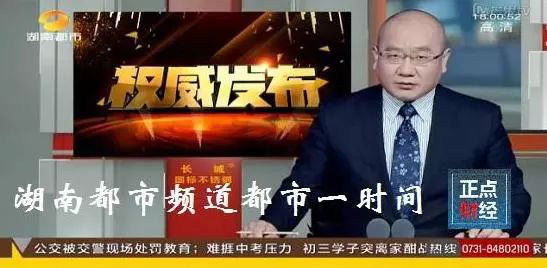
Even a number of livelihood news programs have appeared in the same area. Take Hunan as an example, there are Jing Shi Focus, Zhong Shan Shuo Shi, Hunan Metropolitan Time, Urban Evening, Hunan Public Channel Help Girls Help You, Changsha Political Science and Law Channel Political Science and Law Report, Hunan Xiangtan TV Station Urban Diary and so on.
Through the perspective of civilians, telling the content related to people’s lives, people’s livelihood programs have been well received. Especially for middle-aged and elderly audiences, such programs are particularly attractive.
People’s livelihood programs harvest a large number of young audiences.
In recent years, with the increasing proportion of young people’s consumption in content, the right to speak and the volume of voice have gradually increased. For this group with great potential, people’s livelihood programs began to approach actively.
As far as content is concerned, people’s livelihood programs are returning to news value: "parents are short" is decreasing, and the content that helps citizens solve problems and grasp the pain points of the audience with media advantages is increasing. On the other hand, people’s livelihood programs began to pay more and more attention to editing techniques and narrative methods. As far as "1818 golden eye" is concerned, its unique interview techniques and shooting techniques coincide with the characteristics of subculture and become a source of joy for young netizens.
Secondly, with the transformation demand of local livelihood programs and the Internet platform’s thirst for high-quality content, a large number of official accounts of livelihood programs have settled in bilibili, Tik Tok, Aauto Quicker and other platforms. The famous scenes in the program, after the arrival of the short video era, were re-edited and uploaded by up owners and spawned countless funny creations. Between the unbridled laughter, the clips of people’s livelihood programs full of comedy elements have become the "magic meal" of this generation of young netizens.
In the new media environment, young people become a new generation of loyal viewers of people’s livelihood programs. How to better combine the perspective of people’s livelihood news with the perspective of young users in the future development and give play to the communication function of news is the next important proposition of people’s livelihood programs.
Source: Blue Whale Financial Reporter Work Platform, New List, Gold Medal Public Opinion Officer, etc.
—